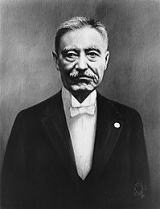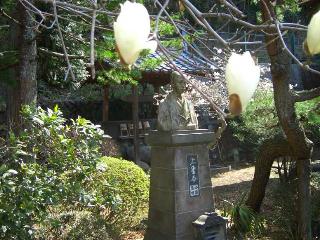| 小栗上野介の言葉 3つ | Three Statements of Kozukenosuke Oguri |
|---|---|
| 島田三郎が伝えた 栗本鋤雲が伝えた 渋沢栄一が伝えた |
Statement passed down by Saburo Shimada Statement passed down by Joun Kurimoto Statement passed down by Eiichi Shibusawa |
| |
|
| 【島田三郎が伝えた、小栗上野介の言葉】 「幕府の運命に限りがあるとも、日本の運命には限りがない」 ―幕府は終わっても日本は続く、と語った小栗上野介 【The words of Kozukenosuke Oguri passed down by Saburo Shimada】 "Even if the fate of the Shogunate is limited, the destiny of Japan is unlimited." Kozukenosuke Oguri, "The Shogunate may be over, but Japan will continue." |
|
| 幕末にある幕臣が「幕府の運命もなかなかむつかしい。費用をかけて造船所を造ってもそれが出来上がる時分には幕府はどうなっているかわからない」と言ったのに対して、小栗上野介が語った言葉。 |
This is what Kozukenosuke Oguri said when one of the shogunate's retainers said, "The fate of the Shogunate is difficult to foresee. Even if we build a shipyard at great expense, we do not know what will happen to the shogunate by the time it is completed," at the end of the Edo period. |
島田三郎・(国立国会図書館) Saburo Shimada (National Diet Library) |
|
| 土蔵付き売据え 小栗はさらに様子を改めて、 「私は幕府の臣であるから幕府のためにつくす身分ではあるけれども、結局それは日本の為であって、幕府のしたことが長く日本のためとなって徳川のした仕事が成功したのだと後に言われれば、徳川家の名誉ではないか。国の利益ではないか。同じ売り据え(売家)にしても土蔵付売据の方がよい。あとは野となれ山となれと言って退散するのはよろしくない」と語った。 (島田三郎「懐舊談」・『同方会報告』明治28年6月・第1号・17P/のち1977昭和52年立体社より復刻) 小栗上野介研究家の大坪指方はこの幕臣を鈴木兵庫頭(重嶺・佐渡奉行・歌人)としている。(『小栗上野介』小栗上野介を偲ぶ会発行・昭和50年) *「売り据え」…建築物を造作(建具・家具など)付きでそっくり売ること。いま「居抜き」物件という。 |
"A house for sale with a storehouse" Oguri further changed his tone and said, "I am a vassal of the shogunate, so I serve the shogunate, but in the end it is for the sake of Japan, and if it is said later that what the shogunate did was for the benefit of Japan for a long time and that the work done by Tokugawa was successful, isn't it the honor of the Tokugawa family? Isn't it in the interest of the nation? It would be better to sell a house with a storehouse than to sell only the house. It wouldn't be a good idea to just leave the rest to fend for itself." (Saburo Shimada, "Kaikyudan", "Dohokai Report", June 1895, No.1, page 17, later reprinted by Rittaisha in 1977) Shiho Otsubo, a researcher of Kozukenosuke Oguri, refers to this retainer as Hyogonokami Suzuki (Shigene, Sado magistrate, poet). ("Kozukenosuke Oguri," published by the Association for the Remembrance of Kozukenosuke Oguri, 1975) |
| |
|
| 【栗本鋤雲が伝えた小栗上野介の言葉】 「土蔵付売家」 【The words of Kozukenosuke Oguri, as conveyed by Joun Kurimoto 】 A House for Sale with a Storehouse |
|
| 小栗上野介の言葉としては、横須賀造船所が出来上がれば、いずれ「土蔵つき売家」の栄誉が残せる、と栗本鋤雲に語った言葉が知られている。(栗本鋤雲『匏庵遺稿』) しかし、学者や作家の中には「これは早くに殺されてしまった小栗上野介を悼んで栗本鋤雲が創作した言葉だろう」「小栗に幕府崩壊の4年前にそれを予見する先見性はないだろう」とするむきもあった。 だが、島田三郎の談話で紹介された「幕府の運命、日本の運命…」「土蔵付売り据」という言葉には、とても後世の創作と言えない臨場感があり、「土蔵付き売家」と合わせると、小栗上野介の心情が痛いほどよく出ている。 真の武士の言葉といえよう。 |
It is well known that Kozukenosuke Oguri told Joun Kurimoto that, once
the Yokosuka Shipyard was completed, they would eventually be able to leave
behind the honor of "a house for sale with a storehouse." (Joun
Kurimoto, "Hoan’s Posthumous Essay") Some scholars and writers have suggested that these words were probably invented by Joun Kurimoto in mourning for Kozukenosuke Oguri, who was killed early in his life, and that Oguri did not have the foresight to foresee this four years before the fall of the Shogunate. However, the words "the fate of the shogunate, the fate of Japan..." and "selling a house with a storehouse" introduced in Saburo Shimada's discourse have a sense of reality that could not be creation of a later generation and they painfully express the feelings of Kozukenosuke Oguri. These are the words of a true samurai. |
 ハクモクレンと小栗上野介胸像 Magnolia and bust of Kozukenosuke Oguri |
|
| < 島田三郎の原文 > ・・・大抵の軍艦が横須賀で出来るのも是も幕府の末に計画したのが発達したのである。是について感ずべき話もある。幕府の亡びたのは専制に対する反動が其一原因であるけれども太平の世に冗費が殖えて臨時に応ずることができないときに突然外交が起きたのである。この繁忙の際に当たって造船所を取立てるなどは随分金のいったことであった。当時これを主張したるものは小栗上野君であった。此の人は勘定奉行で財政の権を握って非常に倹約をして当時の俗吏に悪く言われたけれども、全体英邁の人であった、今健在している栗本鋤雲翁も当時安芸守と云って小栗の片腕であった。翁は早くから洋学もし、洋行もした人である。此の人に造船の事を託して横須賀に造船所を造った。 然るに或人が幕府の運命もなかなかむつかしい。費用をかけて造船所を造ってもその成功する時分には幕府はどうなるか分からないと云ったら、小栗君は容を改めて之に答えた。 「幕府の運命に限りあるとも、日本の運命には限りがない。 我は幕府の臣であるから幕府の為に盡くす身分ではあるけれども、結局日本のためであって幕府のしたことが長く日本の為となって徳川のした仕事が成功したのだと後に言われれば徳川家の名誉ではないか。国の利益ではないか。同じ売り据にしても土蔵付売据の方がよい。跡は野となれ山となれと云って退散するのは宜しくない。」 と云ったが誠に其通りであって… (島田三郎「懐舊談」・『同方会報告』明治28年6月・第1号・17P/1977昭和52年立体社より復刻) |
<Original text> ...The fact that most warships are built in Yokosuka is also due to the development of plans made at the end of the Shogunate. There is also a story about this that is worthy of note. The fall of the Shogunate was partly due to the reaction against tyranny, but diplomacy suddenly arose when redundancy increased in a time of peace, and it was not possible to respond to extraordinary situations. It took a lot of money to build the shipyard at this busy time. At that time, Kozukenosuke Oguri was the one who insisted on this. He was an accountant and had the authority over finances. Joun Kurimoto, who is still alive and well, was one of Oguri's men. The shipbuilding business was entrusted to him, and he built a shipyard in Yokosuka. When one of the Shogunate retainers said that the fate of the Shogunate would be difficult to predict and, even if a shipyard was built at great expense, we do not know what will happen to the shogunate by the time it is completed, Oguri replied to him with a new look and said, "Even if the fate of the Shogunate is limited, the destiny of Japan is unlimited." I am a vassal of the shogunate, so I serve the shogunate, but in the end it is for the sake of Japan, and if it is said later that what the shogunate did was for the benefit of Japan for a long time and that the work done by Tokugawa was successful, isn't it the honor of the Tokugawa family? Isn't it in the interest of the nation? It would be better to sell a house with a storehouse than to sell only the house. It wouldn't be a good idea to just leave the rest to fend for itself." I really think that he was right... (Saburo Shimada, "Kaikyudan", "Dohokai Report", June 1895, No.1, page 17, later reprinted by Rittaisha in 1977) |
| ◆この言葉のやり取りから推測できること 1、幕末期には、徳川幕府の国家経営はすでに組織と運営が行き詰まり、欧米への開国による新しい国家経営戦略を展開しようにも幕府の政治体制に限界があって、このまま長続きさせることはできない、という共通認識が幕臣の間にあった。 2、そういう認識のもとに、「○年後には幕府がどうなっているか分からない」といった会話が普通に交わされ、それを「不忠である」などと非難する雰囲気がなかったこと。何が何でも幕府を存続させる、という認識ではなかった、ということがわかる. 3,この言葉の背景に、「いずれ政権交代はある」とする、政治権力を絶対視しない儒学・陽明学がある。 |
What we can infer from this exchange of words: 1. By the end of the Edo period, the Tokugawa shogunate had reached a dead end in terms of organization and management, and there was a common understanding among the shogunate's retainers that the political system of the shogunate was too limited to continue even if a new strategy of national management through opening the country to the West was developed. 2. Based on this understanding, conversations such as "I don't know what will happen to the shogunate in a few years" were commonly exchanged, and there was no atmosphere of condemnation of such conversations as "disloyalty." We can see that they did not think that the shogunate should continue to exist at any cost. 3. Behind these words are Confucianism and Yangmingshanism, which do not regard political power as absolute and believe that there will eventually be a change of government. |
| 【渋沢栄一が伝えた小栗上野介の言葉】 渋沢栄一の談話の一節 「幕府の運命についての覚悟」 Supplementary material (from "Discourse of Seien-sensei") A passage from Eiichi Shibusawa's discourse |
|
【渋沢栄一は、慶応3年徳川昭武に随行してパリ万博へ出かける前に、パリ万博の出品責任者として昭武へ出航前の挨拶をするため横浜へ来ていた勘定奉行小栗上野介に会い、挨拶した】 渋沢 「今度民部様(昭武)御渡仏に付きまして、主として会計、俗事の係を仰付けられました渋沢篤太夫で御座います。将来共よろしく御願申上げます。民部様の目前の御用は仏蘭西大博覧会に御列席なさるといふ事で御座いますが、之が済みますと大約五年の御予定で御留学の筈で御座います。其間の事に付て彼是心配致して居りますが、最も心にかかるのは会計の事で御座います。其辺の事は申す迄も御座いませぬがよろしく御指導御高配願ひます」 小栗 「いや鄭重の御挨拶で痛み入る。然し一体足下(お前さん)は五年も後のことを心配する柄でもあるまい。第一足下は討幕を企てた程の男(1)ではないか、そんなことを心配するのは可笑おかしい」 突然で流石の子爵(渋沢はのちに子爵になっている)も聊いささか面食らったが、何食わぬ顔で 渋沢 「然しそれは昔の話で御座います」 小栗 「左様昔には相違ないが、未だものの1年か2年しか経過して居らぬではないか…」 鋭鋒は隙すかさず迫る。 渋沢 「では御座いますが、只今では左様も考へて居りませぬ」 何所までも子爵が生真面目で居るので小栗も追及の鋒をおさめた。 小栗 「いやそれは戯談ぎだんである。兎に角今度の民部様御奮発は眞に結構の事である。自分も衷心より喜んで居る。足下の事も承知致し居る(2)。足下の如き為すあるの士が御補佐申上げることは重畳ちょうじょう至極と思はれる。何卒十分御精励あるやう希望する。会計のことに付ては5年は愚か三年でも二年でも将来のことは全然分らぬが、然し病に倒れるか、身を退くかすれば分らぬこと、苟いやしくも不肖小栗が職に在る間は決して心配はかけぬから安心して行くがよい。然し呉々も幕府が何時いつ如何どうになるかは全然分らぬから―此点は敢て小栗が斯く憂慮するばかりでなく、皆人の斉ひとしく感ずる所であるが―或は生きて再び民部様御健勝の御様子を拝することは出来ぬかも知れぬが、其時は其時で如何にかならう。決して心配することはいらぬ。然し幕府の運命に付ての覚悟だけは聢しっかりきめて置くことが必要であらう」 斯くて袂を分ったのが、小栗の斯言悲しくも事実となって一年ならずして彼の如き悲惨極まる末路を見たのであった。 ・・・・・・・・・・・・・・・・・・・以下略…………… 昭和5年3月7日 飛鳥山邸に病後の子爵を訪ひ閑談中に聞き得たる所を ―白石喜太郎憶記― |
Eiichi Shibusawa, before accompanying Akitake Tokugawa to the Paris Exposition in 1914, met Kozukenosuke Oguri, the accountant who had come to Yokohama to greet Akitake before his departure as the person in charge of the Paris Exposition. Shibusawa: "My name is Tokudayu Shibusawa, and I have been assigned to handle the accounting and miscellaneous affairs of the upcoming visit to France by Mr. Minbu (Akitake Tokugawa). I ask for your continued support in the future. His immediate business is to attend the Great Exposition in France and the Netherlands, after which he is expected to study abroad for about five years. I'm worried about everything that's going to happen during this time, but I'm most concerned about the accounting. I don't have to tell you about that, but I would appreciate your guidance and kindness." Oguri: "Thank you very much for your kind greeting. However, you have no business worrying about what will happen five years from now. First of all, you are a man who has plotted against the shogunate, so it is not right for you to worry about such things." Even Viscount Shibusawa was a little taken aback by the suddenness of Oguri's comment, but he said with an indifferent face: "But that was a long time ago." Oguri: "Yes, it must have been a long time ago, but it's only been a year or two..." Shibusawa: "Well, then. I'm not even thinking about it right now." The Viscount's earnestness caused Oguri to relent in his pursuit. Oguri: "It's just a joke. In any case, I'm really glad that Mr. Minbu is so excited about this. I, too, am delighted from the bottom of my heart. I am also aware of your role. I think it is a great honor for him to have a highly motivated person like you assisting him. I hope that you will do your best. As for accounting, I don't know what the future holds, not for five years, not for three years, not for two years, but if I fall ill or retire, I will never know, although I'm not going to make you worry at all while I'm in office, so you can go with confidence. However, since we do not know at all when and how the Shogunate will turn out - and this is not only my concern, but everyone's concern as well - we may not be able to live to see His Highness Minbu in good health again, but whatever will happen will happen. There is nothing to worry about. Nevertheless, it is necessary for us to be firm in our resolve regarding the fate of the Shogunate." It was in this way that they parted company, and in less than a year Oguri's words had sadly become a fact of life, leading to his tragic end.....(omit the rest)....... On March 7, 1930 I visited the Viscount after his illness at his residence in Asukayama. - Kitaro Shiraishi's memoirs |
| 傍線部(1) 「足下は倒幕を企てた程の男」・・・水戸学の攘夷思想にかぶれて仲間と武器を集め赤城山に兵をあげ、高崎城を乗っ取って武器を手に入れ、横浜へ進んで外国人を斬り殺し追い払う計画をたてたが、実行寸前にいとこの渋沢長七郎が京都から戻ってきて必死の説得をしたので取止め、故郷血洗島を出て各地に散った。そのまま実行していたら無謀なテロリストで終りかねない前歴があった。それを小栗上野介が知っていたということ。 傍線部(2) 「足下の事も承知致し居る」・・・お前さんのこともよく承知している。 ➀国のことを考えて立ち上がろうとした志がある人物ということはわかった。 ②随行の責務をしっかり務めなかったら、前歴の責任を取らせる。とりあえず「凶器準備集合罪」は執行猶予中だよ、と釘を刺している。 ◆2018平成31年の渋沢栄一記念館(深谷市)での小栗上野介講演を世話してくれた深谷市の歴史研究家清水氏が、その数か月後に渋沢栄一が1万円札に登場と発表された直後に電話をくれて、「あの時小栗にはねられていたら、1万円札の渋沢栄一はなかったでしょうねえ」と感慨を込めて笑っていたのは、講演でも語った上記の経緯を踏まえての話。 |
|
| 関連ページ □小栗上野介の言葉 1「真の武士」 □小栗上野介の言葉 2「国民利福」 □小栗上野介の言葉4「腰抜け武士に高禄は無用」…幕末の行政改革の基は無用の役職、無用の部局整理から ◇「土蔵付売り据え」横須賀造船所は売家につける土蔵…小栗上野介の言葉 ◇横須賀製鉄所 四つの特徴…この特徴から日本産業革命の地であることがわかる ◇レンガのページ:やっと入手できた、横須賀で作られたレンガ ◇森林保護育成の提唱:造船には多量の木材が必要だから・・・ ◇技師長フランソワ・レオンス・ヴェルニー:横須賀市の冊子(リンク) ◇横須賀明細一覧図を読む:近代工業の先端設備をそろえ、多くの見物客でにぎわった ◇いまの横須賀造船所「日米親善ベース歴史ツアー」(リンク) ◇勝海舟の「海軍500年説」は:「海舟日記」の信憑性ゆらぐ ◇「日本人職人は優秀」「海軍500年説はハッタリ」:1866慶応2年に建設途中の横須賀造船所を視察した若いフランス海軍士官の記録。勝海舟のハッタリは日本人に通用しないことがわかる。 ◇東郷元帥の謝辞:日本海海戦の勝利は小栗さんのおかげ・・・ ◇幕末の構造改革:ネジをお土産にした小栗上野介 ◇横須賀造船所の借款説:「約定書」の読み違いで濡れ衣 ◇小栗の濡れ衣・四国・蝦夷を担保にした:幕末世情混乱の中の根無し草 ◇「横須賀製鉄所物語」(リンク) ◇横須賀製鉄所なくして日本の近代化はなかった(リンク) ◇最新空母と幕末のドック:旧横須賀造船所見学ツアー ◇小栗上野介の言葉「幕府の運命、日本の運命」 |
Related Pages □Words of Kozukenosuke Oguri 1 "A true samurai" □Words of Kozukenosuke Oguri 2: "The People's Welfare □Words of Kozukenosuke Oguri 4: "High stipend is useless for cowardly samurai"s… The basis of administrative reform at the end of the Edo period was the elimination of useless positions and departments. □Kozukenosuke Oguri and Eiichi Shibusawa ... Shibusawa wouldn't have been on the 10,000 yen bill if Oguri had ... at that time. ◇Yokosuka shipyard, "House for sale with a storehouse" ◇Reading the "Detailed Drawing of Yokosuka": Reading from the drawing that Yokosuka was the place of the Industrial Revolution. |